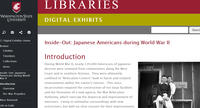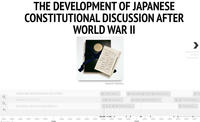This section covers various software useful in launching a digital project, as well as programs that support the overall research process. Not all software is specific to working with Japanese, but all can accommodate multilingual work in some way. If you have a project you would like to see featured, please let us know.
Digital Toolkit
Web Publishing
Esri StoryMaps
Esri StoryMaps
Esri StoryMaps Exhibits on Japan
 京都大学地理学教室所蔵の絵葉書コレクション: Kyoto Univ, Dept of Geography Postcard Collection
京都大学地理学教室所蔵の絵葉書コレクション: Kyoto Univ, Dept of Geography Postcard Collection
 Life of U.S. Military Families in Tokyo: University of Maryland Library
Life of U.S. Military Families in Tokyo: University of Maryland Library
Omeka
Omeka
Japan Omeka Exhibits
 Imaging Kanto, Mapping Japan’s 1923 Earthquake through Visual Culture: Duke University, Gennifer Weisenfeld and Nicole Gaglia
Imaging Kanto, Mapping Japan’s 1923 Earthquake through Visual Culture: Duke University, Gennifer Weisenfeld and Nicole Gaglia
Scalar
Scalar
Scalar Exhibits on Japan
 Bodies and Structures: Deep-Mapping Modern East Asian History: David Ambaras, NC State and Kate McDonald, UC Santa Barbara
Bodies and Structures: Deep-Mapping Modern East Asian History: David Ambaras, NC State and Kate McDonald, UC Santa Barbara
 Unpinning History: Japanese Posters in the Age of Commercialism, Imperialism, and Modernism: University of Southern California (USC) Libraries
Unpinning History: Japanese Posters in the Age of Commercialism, Imperialism, and Modernism: University of Southern California (USC) Libraries
 Japanese Book History: A View from USC LIbraries: Rebecca Corbett, University of Southern California
Japanese Book History: A View from USC LIbraries: Rebecca Corbett, University of Southern California
 Mapping Isabella Bird: Geolocation and Unbeaten Tracks in Japan (1880): Christina M. Spiker, Art Historian
Mapping Isabella Bird: Geolocation and Unbeaten Tracks in Japan (1880): Christina M. Spiker, Art Historian
Timeline.JS
Timeline.JS
TimelineJS Exhibits on Japan
Further assistance is also available through the Digital Scholarship Support Group (DSSG), which brings together Harvard faculty and staff with expertise in incorporating digital methods into their teaching and research. In addition to a recurring Foundations Seminar Series, the DSSG also provides individual guidance on getting started with digital scholarship projects. Drop in during Office Hours with questions and DSSG members will suggest tools, methodologies, and approaches that benefit your work, and try to connect you with relevant resources, organizations, and researchers. We encourage you to fill out this Google Form before attending Office Hours so that the appropriate DSSG experts can be contacted.
Consultation requests for digital project planning, library research, and training in the skills associated with software tools are welcome and encouraged. Please email Katherine Matsuura or Mac Gill to schedule an appointment.










